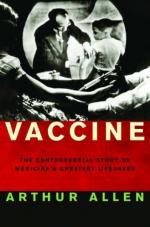|
This section contains 2,985 words (approx. 10 pages at 300 words per page) |

|
Nowhere is the effort to use science and technology for human benefit clearer than in the development of vaccines against serious infectious diseases. Although vaccinations seldom have unintended consequences they can, on occasion, pose complex ethical issues.
Historical Developments
One of the key figures in Western vaccine history is the English physician Edward Jenner, who developed an effective prophylactic against smallpox in 1796. The protective material that Jenner used came originally from a cow infected with cowpox. When infected cows were milked, Jenner noted, as others had before him, that the milkmaids who did the milking developed pustules or sores on their hands that disappeared in time and did not harm the girls. These girls, it was further observed, did not get smallpox, which is a disease that left unsightly pockmarks on the face and skin where the pustular sores had been, and in about...
|
This section contains 2,985 words (approx. 10 pages at 300 words per page) |

|


